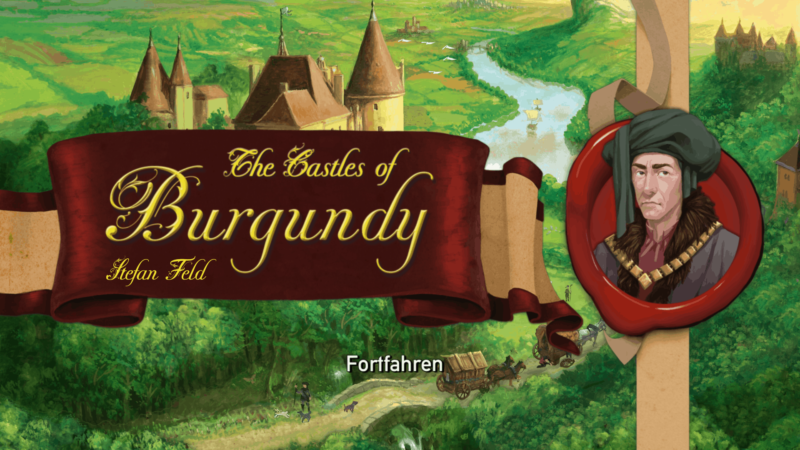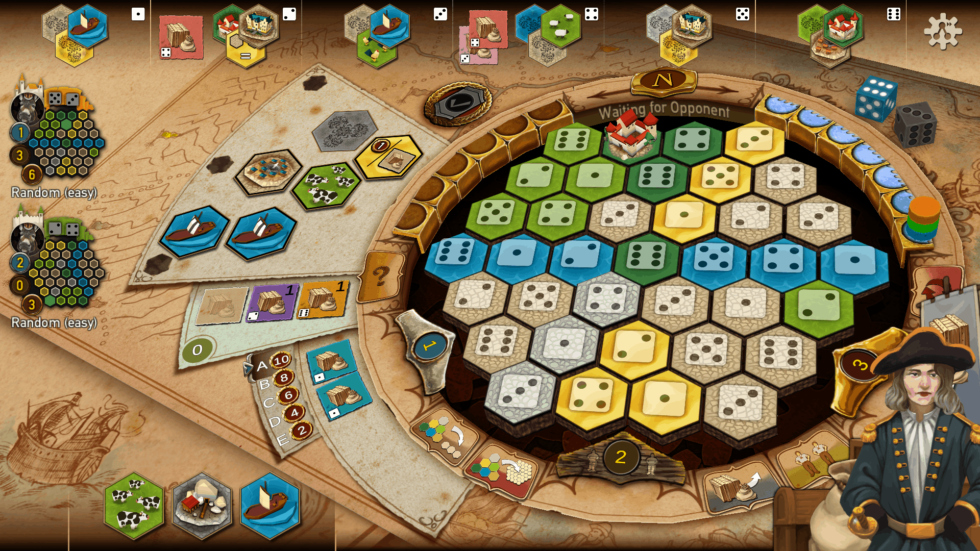
The Castles of Burgundy has long been one of my favorite strategy board games, a 90-120 minute game of tile-laying with a complex scoring system that is often derided as “point salad,” meaning you can get points from so many different paths that there might seem to be no logic to it. I mention that up front because I think it’s a fair criticism of this style of game. Still, Castles of Burgundy is the best implementation I’ve seen of that sort of scoring, especially since designer Stefan Feld, who specializes in this sort of game, connects the different tile types in multiple ways, creating a game that scratches that complex scoring itch but is also well-balanced and coherent.
Digidiced has now brought Castles of Burgundy to Steam and to mobile platforms in a great-looking app that uses new artwork and allows for quick gameplay against AI opponents. Despite a few quirks in the first release, it’s a strong introduction to the game for new users and smooth experience for local play, although I’d like to see a smarter “hard” AI opponent and perhaps a more streamlined tile-placement system. Online multiplayer games could still use some work, especially regarding how the app handles timed play and an occasional bug that occurs when switching games (which is enough of a concern that I’d suggest holding off on purchasing the app if you prefer online play versus local or solo games).
CoB players each work to fill in a personal board of 36 hex tiles (plus one that is already filled in at the start) by selecting tiles of six different types, matching them to the colors on their own boards, placing tiles adjacent to anything they’ve already built, and then gaining points and/or other rewards from every placement. Each tile color has a different function within the game and scores differently—hence the point-salad criticism. There are layers of bonuses within the game for filling in a specific region of your board, which is worth more points if you do it earlier in the game, or for filling all hexes of a specific color on your entire board.
The game unfolds over five stages, each of which has five rounds within it, and you get two actions in each round, although you can also gain quite a few “free” actions by playing certain tiles. With each player getting a minimum of 50 actions over the course of an entire game, Castles of Burgundy is not a quick play. But it isa real thinker of a game because you’re trying to build a long-term plan while also keeping an eye on what opposing players might do, jockeying for position on the turn order track, and weighing short-term point gains against the potential for larger bonuses as the game nears its end.
Digidiced’s implementation is more than adequate, but it definitely needs some fine-tuning now that it’s out in the wild. Once you know the game, you’ll want to crank up the app’s speed to Fast, because it’s far too pokey at Medium and excruciating at Slow, with two-player games against the AI taking well over half an hour on that slowest setting. Some users have also reported heavy battery usage from the tablet versions of the app, but I have not experienced that even playing with the HD setting on.
The app has an undo feature, essential for many reasons, the main one of which is that it allows you to test out a move. Because the scoring is a bit involved, you may want to try a couple of different moves to see which nets you the most points before committing. The undo function only lets you restart your entire turn, however, rather than just rolling back your last move, which can be a mild hassle.
Although the artwork is cute and clear, the app inherits the base game’s disconnect between the (very bland and brown) building tile images and their functions. There are eight such building types, and each has a unique role in the game, from giving you two gold to letting you select a tile of a specific color from the main board to letting you place a tile onto your personal board without using an action. There’s nothing obvious in the tile artwork that lets you know what each tile does, which means you have to press on the tile (on mobile) and hold until you get a pop-up that explains it. Eventually you’ll start to remember most of the tiles’ functions by their images, although I still find the watchtower (four points, no other bonus) and the warehouse (sell all of your trade goods of one color) to be too similar.

Online play gives you a few options, including quick games versus ranked ones where you have up to 24 hours to make your move. If you’re playing one game, however, the app doesn’t notify you if it’s your turn in a different game—even if you’re playing a local game and you’re up in an online one with a timer running. When you switch games, the app also replays everything that’s happened since your last turn— even if you were ‘”watching” those opponents’ moves—so playing multiple games at once is more aggravating than it needs to be. (This is especially true since sometimes switching from a game to the list of running games is the only place where I encountered a bug; the screen would say “Loading” but would never load anything).
There’s also no live timer on the screen while it is your turn; you can only see your time left for a move in the list of running games, but not once you enter the screen for a specific game. It also took me a few turns to realize that the app was showing me the “time’s up” icon because the next player had already been booted from the game for missing an earlier turn.
I’ve played mostly solo games, due to some of the issues I mentioned with online play, and have found the Castles of Burgundy app to be a good distraction and a reminder of how much I enjoy the tabletop game. The hardest AI setting can still be a little predictable, and depending on how the random tile draws go, it can be anything from a moderate challenge to being easy to beat (especially by seizing first place in the turn order early in the game), but it’s never enough of a pushover that I found myself uninterested in playing again.
Since playing the physical game against live opponents can easily run an hour and a half or more, getting Castles of Burgundy in digital form is a boon for anyone who loves the game. With some updates to the online play portion, the app would be an easy recommendation for anyone who likes the original game.
https://arstechnica.com/?p=1490629

